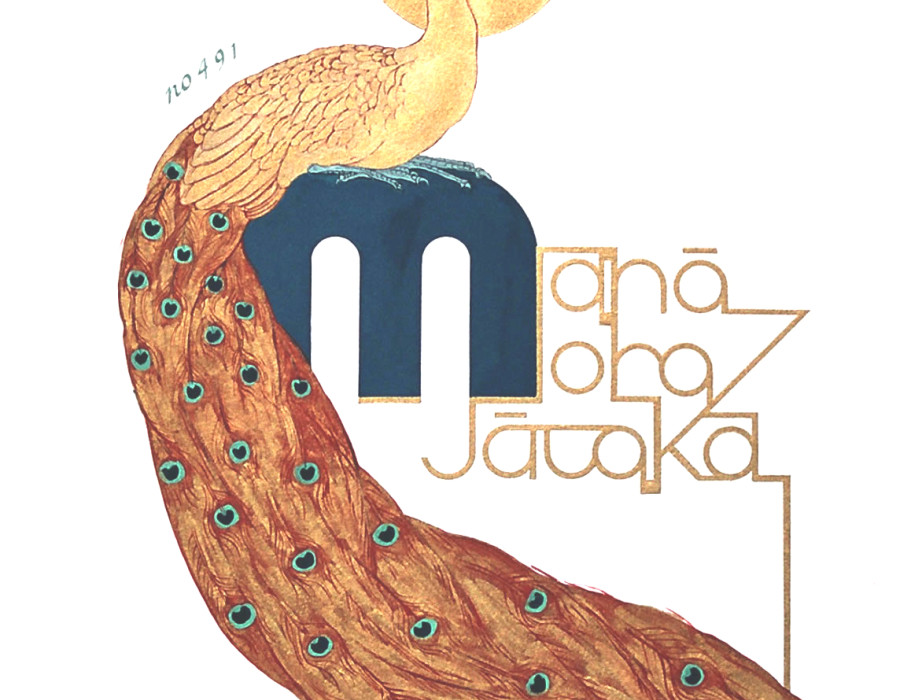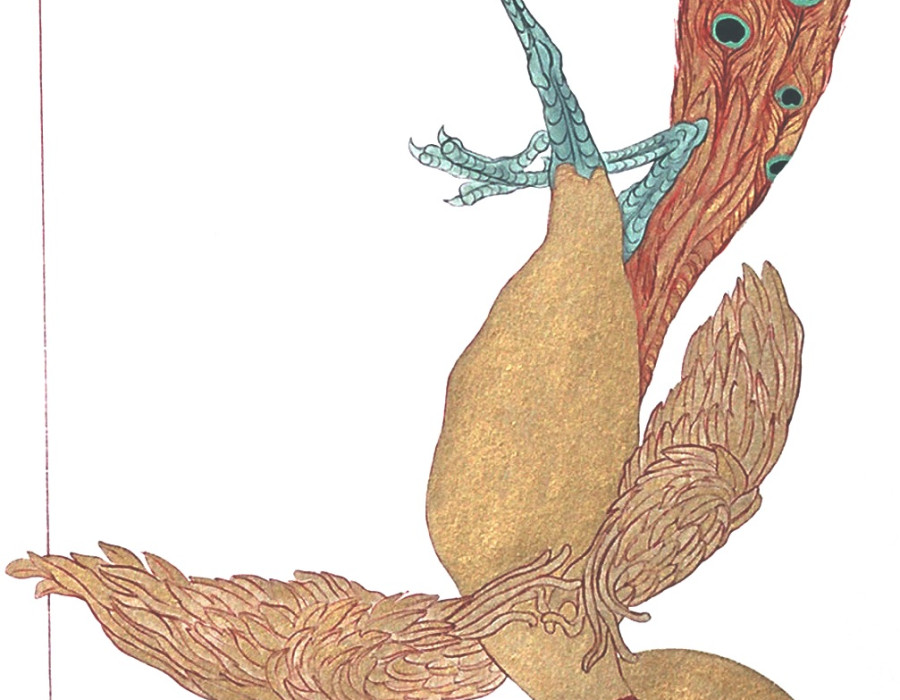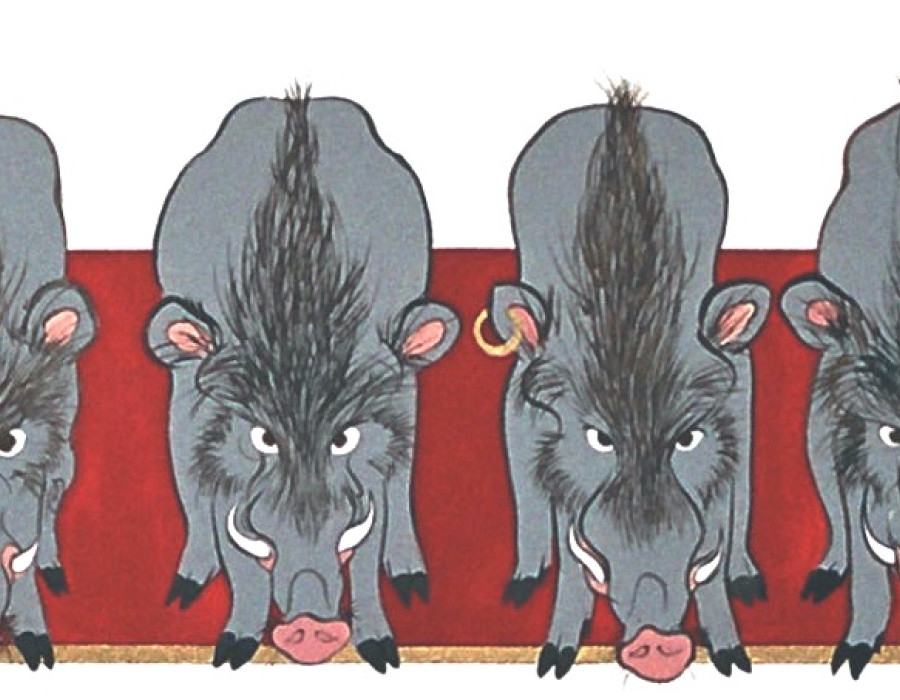An Illustrated Jātaka:Mahāmora-jātaka (part 1)
The Tale of the Golden Peacock illustrated by Roberta Mansell
These tales tell of the previous births of Shakyamuni Buddha and appear throughout the scriptures. They tell how the Great Being (Bodhisattva), developed the virtues which in turn led to his final re-birth and attainment of Complete and Perfect Enlightenment.

Maha Mora Jataka The Great Peacock
Roberta Mansell
Once upon a time, when Brahmadatta was king of Benares, the Bodhisattva was conceived by a Peahen in a border country.
When the due time had passed, the mother laid her egg in the place where she was feeding, and went away. Now the egg of a mother which is healthy comes to no harm, if there be no danger from snakes or such-like vermin. This egg therefore being of a golden colour like to a kanikara bird, when it was ripe, cracked of its own force, and issued forth a peachick of the colour of gold, with two eyes like gunja fruit, and a blue beak.

Peahen & Grasshopper
Roberta Mansell
When he grew up his body was big as a tradesman's barrow, very fine to behold, and all the dark peafowl gathered together and chose him to be their king.
One day, as he was drinking water out of a pool, he espied his own beauty, and thought, "I am fairest of all peacocks. If I remain with them among the paths of men, I shall fall into some danger: I will go away to Himalaya, and there dwell alone in a pleasant place." So in the night time, when all the peafowl were in their secret retreats, unknown to any he departed to Himalaya, and traversing three ranges of mountains settled in the fourth. This was in a forest where he found a vast natural lake all covered with lotus, and not far away a huge banyan tree hard by a hill; in the branches of this tree he alighted. In the heart of this hill was a delightsome cave; and being desirous to dwell there, he alighted on a flatland just at the mouth of it. Now to this place it was impossible to climb, whether up from below or down from above; free it was from all fear of birds, wildcats, serpents, or men. "Here is a delightful place for me!” he thought. That day he remained there, and on the next coming forth from the cave he sat on the hill-top facing the east. When he saw the sun's globe arise, he protected himself for the coming day by reciting the verse:
"There he rises, king all-seeing."
After this he went out seeking for food. In the evening he returned again, and sat on the top of the hill facing the west; then, when he saw the sun's globe sinking out of sight, he protected himself against the coming night by reciting the verse:
“There he sets, the king all-seeing.”
In this manner his life was passed.
But one day a hunter who lived in the forest caught sight of him as he sat on the hill-top, and then went home again. When his time came to die he told his son of it: "My son, in the fourth range of the mountains, in the forest, lives a golden peacock. If the king wants one you know where to find him."
One day the chief queen of the king of Benares (her name was Khema) saw a vision in the dawning, and the vision was after this fashion: a golden peacock was preaching the Law, she was listening with approval, the peacock having finished his discourse arose to depart, she cried out upon it, "The king of the peacocks is escaping, catch him!" And as she was uttering these words, she awoke. When she awoke, and perceived that it was a dream, she thought, "If I tell the king it was a dream he will take no notice of it; but if I say it is the longing of a woman with child, then he will take notice." So she made as though she had a craving as they who are with child, and lay down. The king visited her and asked what was her ailment. "I have a craving," said she. "What is it you desire?” "I wish, my lord, to hear the discourse of a golden-hued peacock." "But where can we get such a peacock, lady?" "If one cannot be found, my lord, I shall die," "Do not trouble about it, my lady; if there exist such a one anywhere, it shall be got for you."

Peacock & Queen
Roberta Mansell
Thus he consoled her, and then went away and sitting down asked his courtiers the question: "Look you, my queen desires to hear the discourse of a golden peacock. Are there such things as golden peacocks?" “The brahmins will know that, my lord." The king enquired of the brahmins. Thus the brahmins made answer: "O great king! It is said in our verses of lucky marks, Of water-beasts fish, tortoises, and crabs, of land-beasts deer, wild-geese, peacocks, and partridges, these creatures and men too can be of a golden colour." Then the king gathered together all the hunters that were in his domains, and asked them, had they ever before seen a golden peacock. They all answered, no, except the one whose father had told him what he had seen. This one said, "I have never seen one myself, but my father told me of a place where a golden peacock is to be found."

Fish & Turtle - golden in colour
Roberta Mansell
Then the king said, "My good man, this means life and death to me and my queen: catch him and bring him hither.” He gave the man plenty of money and sent him off.
The man gave the money to his wife and son, and went to the place and saw the Great Being. He set snares for him, each day telling himself the creature would certainly be caught; yet he died without catching him. And the queen too died without having her heart's desire. The king was very angry and wroth, for he said, "My beloved queen has died on account of this peacock"; and he caused the story to be written upon a golden plate, how that in the fourth range of Himalaya lives a golden peacock, and they who eat his flesh will be ever young and immortal. This plate he placed in his treasury, and afterwards died. After him another king rose up, who read what was written upon the plate, and being desirous to be immortal and ever young, sent a hunter to catch him; but he died first like the other. In this manner six kings succeeded and passed away, six hunters died unsuccessful in Himalaya.
…
(to be continued... )
Text is based on:
(Mahāmora-jātaka: tr. Cowell, E. B. (ed.). Chalmers, Robert, W. H. D. Rouse, H. T. Francis, R. A. Neil, E. B. Cowell (trans.). 1895–1907. The Jātaka or Stories of the Buddha's Former Births. 6 vols. Cambridge: Cambridge University Press. vol. IV)








